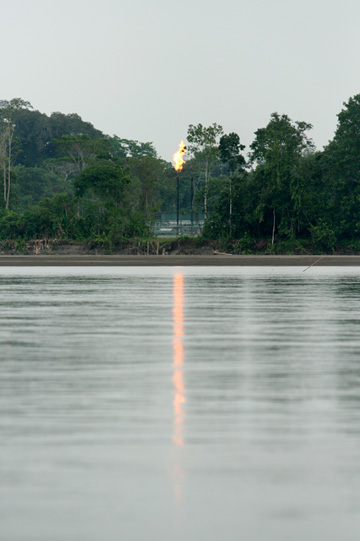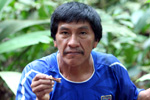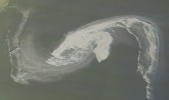It was the environmental legal battle that some believed would never end (and they may still be right). But today in Lago Agrio, Ecuador, after 18 years of an often-dramatic court case, Chevron was found guilty of environmental harm and ordered to pay $8.2 billion in damages, however the oil giant says it will appeal the ruling. The lawsuit was filed by indigenous groups in the Ecuadorian Amazon who argue that poor environmental safeguards from Texaco in the 1970s and 80s led to widespread oil contamination and high rates of diseases, including cancer, among the populace. In 2001 Chevron purchased Texaco and inherited the legal fight. For its part, Chevron has dubbed the ruling “illegitimate” and with an appeal will drag the case on longer.
Following the ruling, the plaintiff’s lead attorney, Pablo Fajardo, issued a short statement saying that his plaintiff’s “provided the court with a great quantum of scientific and documentary evidence that Chevron deliberately and in violation of all industry norms discharged billions of gallons of toxic waste into the rainforest and into the water supply relied on by thousands of Ecuadorian citizens.”
 Gas flare at an oil refinery in the Ecuadorian Amazon. Photo by Jeremy Hance. |
Despite the likelihood of the legal battle continuing past this ruling, environmentalists and human rights groups called today’s verdict ‘historic’. It is the first time indigenous people have won a suit against a multinational corporation in the country where the damage occurred.
“Today’s ruling in Ecuador against Chevron proves overwhelmingly that the oil giant is responsible for billions gallons of highly toxic waste sludge deliberately dumped into local streams and rivers, which thousands depend on for drinking, bathing, and fishing,” two organizations Rainforest Action Network and Amazon Watch said in a joint release.
According to the plaintiffs, Texaco buried toxic oil waste in crude shallow pits that eventually leached into the Ecuadorian Amazon’s river system, contaminating drinking water and resulting in the deaths of over 1,000 people. The full suit was for $27 billion in damages.
For its part, Chevron has argued that Texaco, which drilled in conjunction with local company Petroecuador for decades, spent $40 million cleaning up oil over three years and in return was released from any possibility of lawsuit. However, the plaintiffs have argued that agreement was illegal.
Chevron has stated in the past that if it lost the case, it would simply refuse to pay damages. Since the company doesn’t have any assets in Ecuador, judges in other nations would have to hold up the ruling to hold Chevron accountable.
After the ruling came down, Chevron released a statement arguing that the verdict was “the product of fraud and is contrary to the legitimate scientific evidence.”
“United States and international tribunals already have taken steps to bar enforcement of the Ecuadorian ruling. Chevron does not believe that today’s judgment is enforceable in any court that observes the rule of law,” the oil company’s statement continues.
Chevron also said “it intends to see that the perpetrators of this fraud are held accountable for their misconduct.”
Charges of fraud have also been leveled at Chevron for alleged involvement in a fake video scheme to catch a presiding judge in 2009 accepting bribery. Taken by an Ecuadorian Chevron contractor and an American felon the video led to the judge recusing himself, although no bribe was accepted. While Chevron says it played no role in producing the video, critics have accused the oil-giant of trying to wreck the legitimacy of the trial. After the video was taken, the Chevron contractor involved in the video was moved to the US and provided for by the company.
“Rather than accept [their] responsibility, Chevron has launched a campaign of warfare against the Ecuadorian courts and the impoverished victims of its unfortunate practices. We call on the company to end its polemical attacks and search jointly with the plaintiffs for common solutions,” the plaintiff’s lead attorney, Pablo Fajardo, concluded.
The ruling didn’t have any immediate impact on Chevron’s stocks, which rose today by 1.3%.
Related articles
Oil, indigenous people, and Ecuador’s big idea

(11/23/2010) Ecuador’s big idea—potentially Earth-rattling—goes something like this: the international community pays the small South American nation not to drill for nearly a billion barrels of oil in a massive block of Yasuni National Park. While Ecuador receives hundred of millions in an UN-backed fund, what does the international community receive? Arguably the world’s most biodiverse rainforest is saved from oil extraction, two indigenous tribes’ requests to be left uncontacted are respected, and some 400 million metric tons of CO2 is not emitted from burning the oil. In other words, the international community is being asked to put money where its mouth is on climate change, indigenous rights, and biodiversity loss. David Romo Vallejo, professor at the University of San Francisco Quito and co-director of Tiputini research station in Yasuni, recently told mongabay.com in an interview that this is “the best proposal so far made to ensure the protection of this incredible site.”
Oil devastates indigenous tribes from the Amazon to the Gulf

(07/27/2010) For the past few months, the mainstream media has focused on the environmental and technical dimensions of the Gulf mess. While that’s certainly important, reporters have ignored a crucial aspect of the BP spill: cultural extermination and the plight of indigenous peoples. Recently, the issue was highlighted when Louisiana Gulf residents in the town of Dulac received some unfamiliar visitors: Cofán Indians and others from the Amazon jungle. What could have prompted these indigenous peoples to travel so far from their native South America? Victims of the criminal oil industry, the Cofán are cultural survivors. Intent on helping others avoid their own unfortunate fate, the Indians shared their experiences and insights with members of the United Houma Nation who have been wondering how they will ever preserve their way of life in the face of BP’s oil spill.
Amazon tribes have long fought bloody battles against big oil in Ecuador

(09/03/2009) The promotional efforts ahead of the upcoming release of the film Crude have helped raise awareness of the plight of thousands of Ecuadorians who have suffered from environmental damages wrought by oil companies. But while Crude focuses on the relatively recent history of oil development in the Ecuadorean Amazon (specifically the fallout from Texaco’s operations during 1968-1992), conflict between oil companies and indigenous forest dwellers dates back to the 1940s.